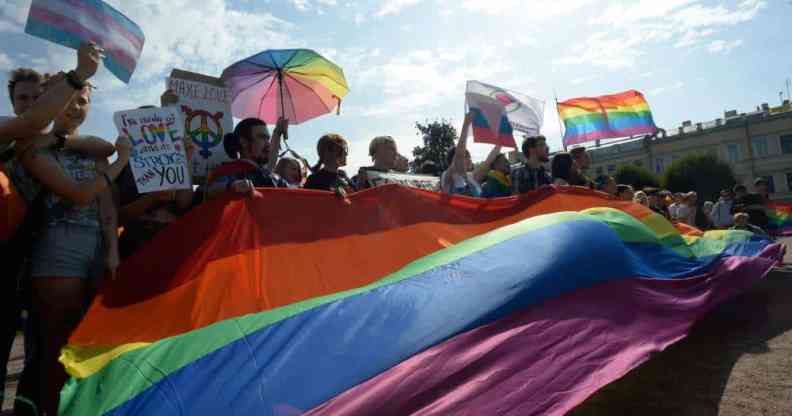Russia’s first trans politician Yulia Alyoshina quits over vile ‘LGBTQ+ propaganda’ laws

Activists say Russian politicians’ attempts to expand ‘gay propaganda’ laws and bills to erase LGBTQ+ media have a devastating impact on queer people in Russia. (Olga Maltseva/AFP via Getty)
Russia’s first trans politician, Yulia Alyoshina, has made the “difficult decision” to retire due to the country’s expansion of its “LGBT propaganda” law.
Alyoshina, who headed the Civic Initiative party’s office in the Altai Krai region, announced on Thursday (27 October) that she will step down from politics.
It follows Russian lawmakers backing a bill to expand an existing ban on the promotion of “LGBT propaganda” among children to include people of all ages.
In a Telegram post she wrote: “Today, the State Duma (Russian parliament’s lower house) adopted in the first reading the bill on banning LGBT propaganda.
“I have never engaged in such propaganda, but I have no idea how to continue conducting public political activities, being an openly transgender woman.”
‘Ahead of my time’
In the post, Alyoshina opened up about how her trans identify has made things difficult for her in politics.
She explained she was barred from attending parliamentary sessions in her region, and denied registration as a candidate for the Barnaul municipal Duma.
“I entered politics, planning to struggle for the rights and liberties of all citizens, regardless of their ethnicity, orientation, or even their political views; and I did struggle for them. But I think I was a bit ahead of my time,” Alyoshina reflected.
Fines and deportations
The new bill, which was passed unanimously on its first reading by the lower house State Duma, prohibits any event or act deemed to promote homosexuality – online, in film, books, advertising or in public.
Under the new legislation, citizens could be fined up to 400,000 roubles (£5612,78) for promoting “LGBT propaganda”, according to Reuters.
Meanwhile, legal entities could be fined up to 5 million roubles, while foreigners found guilty would face deportation from the country.
Russia’s crackdown on LGBTQ+ expression saw hefty fines placed on TikTok earlier this month after it was found to be “promoting” LGBTQ+ content to under-18s.
PinkNews has contacted Yulia Alyoshina for comment.

